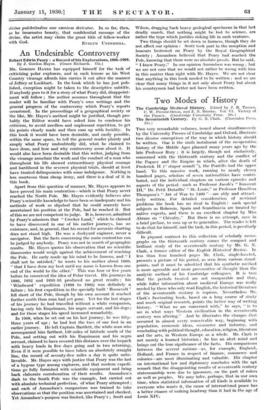Two Modes of History
Two very remarkable volumes, issued almost simultaneously by the University Presses of Cambridge and Oxford, illustrate two diverse conceptions of the way in which history should be written. One is the sixth instalment of the co-operative,
history of the Middle Ages planned many years ago by the late Professor Bury ; it is largely, though not exclusively, concerned with the thirteenth century and the conflict of the Papacy and the Empire in which, after the death of Frederick II (" stupor mundi "), the Pontiffs had the uPper . hand. To this massive work, running to nearly eleven hundred pages, scholars of seven nationalities have contri- buted, and the individual chapters on various episodes and aspects of the period—such as Professor Jacob's " Innocent III," Dr. Petit Dutaillis' " St. Louis," or Professor Hamilton Thompson's " Art of War to 1400 "—are ably and attract- ively written. For detailed consideration of sectional problems the book has no rival in English : such special subjects as Bohemia, Spain and Scandinavia are treated by native experts, and there is an excellent chapter by Miss Abram on " Chivalry." But there is no attempt, save in a brief preface, to sum up or to generalize. The reader is left to do that for himself, and the task, in this period, is peculiarly difficult.
In piquant contrast to this collection of scholarly mono- graphs on the thirteenth century comes the compact and brilliant study of the seventeenth century by Mr. G. N. Clark, a former editor of the English Historical Review. In less than four hundred pages Mr. Clark, single-handed, presents a picture of his period, as seen from various stand- points, and .it must be admitted that his synthetic method is more agreeable and more provocative of thought than the analytic method of his Cambridge colleagues. It is true that the periods treated arc not comparable and that, while fuller information about medieval Europe was really needed by those who only read English, the historical literature of the seventeenth century is copious. Nevertheless Mr.
Clark's fascinating book, based on a long course of study and much original research, points the better way of writing history. " What we arc concerned with," he says, " is to see in . what ways Western civilization in the seventeenth century was altering." And he illustrates the changes that occurred in almost every conceivable way, beginning with population, economic ideas, commerce and industry, and concluding with political thought, education, religion, literature and the arts, in Western Europe as a whole. Mr. Clark is not merely a learned historian ; he has an alert mind and brings out the true significance of the facts. His comparisons between the several nations—as, for example, England, Holland, and France in respect of finance, commerce and colonies—are most illuminating and valuable. His chapter on international law and diplomacy concludes with the apt remark that the disappointing results of seventeenth century statesmanship were due to ignorance, on the part of rulers as well as peoples. We may infer, perhaps, that in our own time, when statistical information of all kinds is available to everyone who wants it, the cause of international peace has
a better chance of making headway than it had in, the age of Louis XIV.






































 Previous page
Previous page